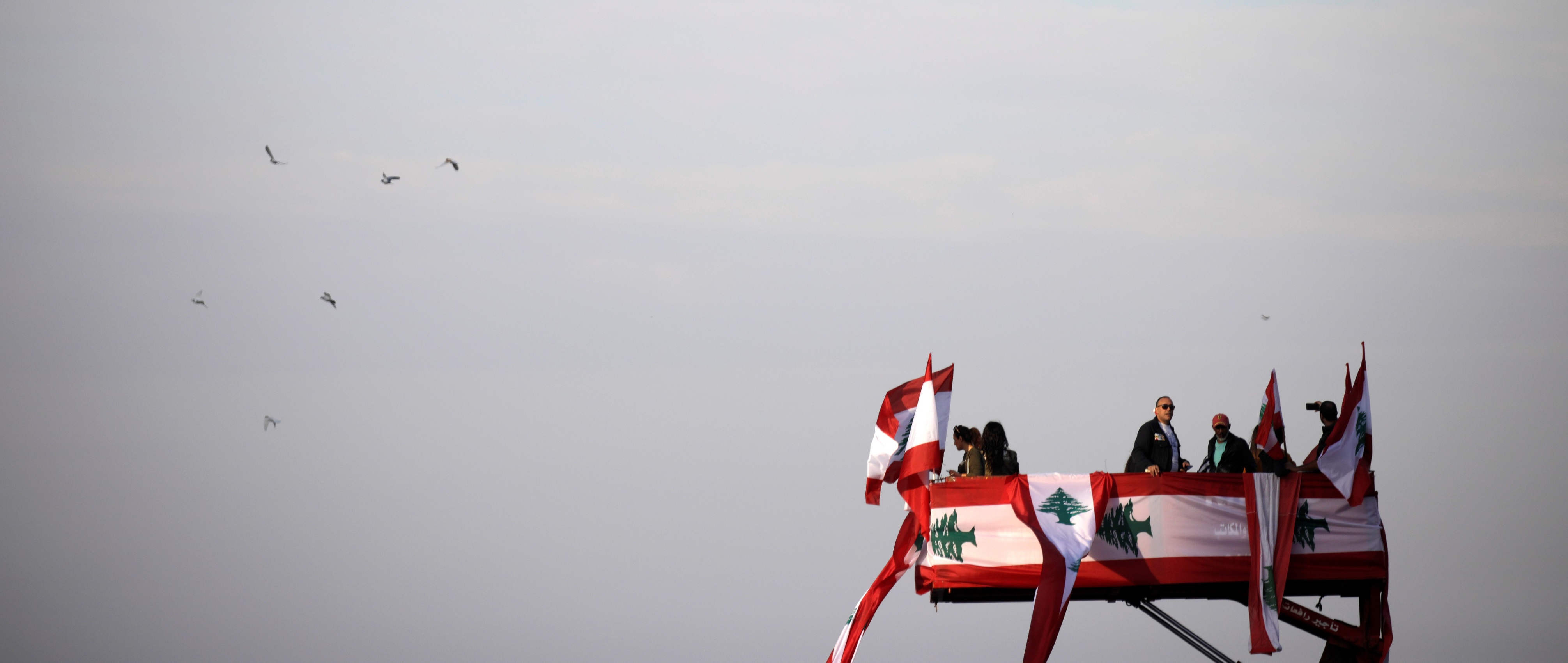تدرس المعايير المهنية والأخلاقية منذ عشرات السنين كيف يستطيع الصحفي تحييد رأيه ومشاعره، وهو يحرر الخبر ويقدمه للمشاهد خاليا من الأحكام والتوجيه المباشر وغير المباشر. وفي بعض الأحيان، يخضع الصحافي للمحاسبة، حين يغرق في التعاطف مع قضية ما فيصبح ناطقا باسمها.
لكن المتتبع للمشهد الإعلامي المصاحب للتحركات الشعبية بمختلف تعبيراتها: ثورات أو احتجاجات أو مظاهرات، يلاحظ كيف وقع الإعلام في العديد من الدول العربية في فخ التعاطف وتبني القضايا أكثر من أصحابها ربما.
والملفت أن التراكم الصحفي لبعض الدول، لم يكن كافيا لحمايتها من الوقوع في مزالق مهنية إن صح وصفها بهذا المصطلح.
ليبيا ولبنان.. تشابه حد التطابق
كم كان مفاجئا وصادما جدا تكرار مشاهد يمكن وصفها بالسقطات المهنية لصحفيين من دولة لها باع وتاريخ عريق في الصحافة والالتزام بأدبياتها كلبنان!
كصحفية ليبية متابعة للأحداث في لبنان، كنت أتابع التجربة الصحفية أكثر من الأحداث، إذ شكّلت بالنسبة لي امتحاناً واقعيا لقدرة الإعلام على الحفاظ على التوازن المهني وسط تجاذبات كثيرة وصعبة على المستوى الإنساني والوطني.
وتعاملت مع التغطية، مثل امتحان صعب لمهنية الصحفي، ليقيني أننا كصحفيين في ليبيا رسبنا في ذلك بشكل أو بآخر، وإن كانت مرحلة الرسوب صنعت دافعا لإصلاح مواطن الخطأ ودراسة أماكن وأسباب الخلل.
لا أسعى، من خلال هذا المقال، إلى التشهير بأسماء معينة أو اتهامها في نزاهتها، بقدر ما أعتبر المقال تفكيرا بصوت عال لصحفية تسعى للحصول على معلومات واقعية غير تلك التي درسناها على المستوى النظري عبر بسط أربعة مشاهد تبيّن التقاطع بين التجربتين الليبية واللبنانية.
المشهد الأول
الغريب أن الأحداث تتشابه في البلدين. فقد كانت قناة في ليبيا تسمى "العاصمة" تضع على شاشاتها سنة 2014 عدّاً تنازلياً لانتهاء ولاية المؤتمر الوطني. بعد خمس سنوات سيتكرر ذات المشهد في إحدى القنوات اللبنانية، فتضع عدا تنازليا للمهلة التي طلبها رئيس الحكومة سعد الحريري.
وفي الحالتين انتهاك صريح لقيمة صحفية غير قابلة للتفاوض، كما وصفها آلن ليتل مراسل بي بي سي الخاص، وهي قيمة الحياد أو لنقل التوازن المهني، فالمؤسسة هنا تضع نفسها خصما مباشرا لجهة سياسية، بل وتذهب أبعد من ذلك وتسمي تلك الجهة وتهددها بلغة الأرقام التنازلية.
المشهد الثاني
تمثل جليا في نقاش محتدم بين صحفيتين لبنانييتن تتهم إحداهما بأنها إرهابية في لقاء مباشر، وكان النقاش بين الصحفيتين كارول معلوف ومريم البسام في لقاء على قناة "الجديد"، وهو مشهد تكرر مرارا في الإعلام الليبي باتهام صحفيين ومؤسسات إعلامية بالإرهاب ودعمه كما حدث مع تلفزيون "النبأ" الليبي الذي اتهم بدعم الإرهاب وتعرض لأكثر من هجوم مسلح انتهى بإحراقه تماما وخروج صحافييه من ليبيا!
مشهد يعيد للأذهان كلمة للوزير اللبناني السابق زياد بارود في احتفالية لليوم العالمي لحرية الصحافة بتاريخ سبتمبر 2002 قال فيها "لم نعد نحاكم على ما نكتبه، بل ربما على ما لم نكتبه. لم نعد نحاكم ونحاسب على مانقوله بل ربما على مايعتقدون أنها كانت نياتنا، ماذا يحصل في لبنان؟ ولماذا هذا الجنون وهذه الهستيريا".
المشهد الثالث
من جهة أخرى، أصبحت المؤسسات الإعلامية هي من تقود الحراك الشعبي في لبنان تجاوز، إذ أن بعضها تخطى المتابعة الصحفية ليتحول إلى أداة للتحريض، مستخدماً لغة تجاوزت التأييد إلى صناعة الحراك ووضع توقيت بدايته ونهايته. وهو تماما ما حدث على بعض القنوات الليبية، التي كانت تخرج ببث مباشر من ساحات معينة بحجة وجود معلومة عن تجمع أو تظاهر لتحريض الناس بشكل غير مباشر للتوجه إلى تلك الساحات، وهي ممارسة صحافية غير سليمة، تتجاوز صناعة الأخبار إلى تسيير الأحداث وصنعها بالطريقة التي تناسب تلك المحطات.
حتى أن بعض الصحفيين وصل بهم الأمر إلى التحول لمتظاهرين، ويسمحون لأنفسهم بتبني آراء ووجهات نظر، بل وكيل التهم لهذا المسؤول أو ذاك!
فهل هو خلل في نزاهة الصحفي؟ أم هو انقياد لتوجه مؤسسته؟ أم هي حالة إنسانية لم تعرها معايير الصحافة اهتماما، وكان عليها أن تضع قاعدة لهذه الاستثناءات؟ ذلك أن قدرة الصحفي على تغطية أحداث خارج بلده تكون أكثر التزاما بمعايير المهنة، ويكون الصحفي قادرا على مواجهة وتوجيه أسلوبه حال انحرافه كما يظهر في تغطية صحفيين غير لبنانيين أو غير ليبيين لأحداث كلا البلدين.
المشهد الرابع
ومن المشاهد المتشابهة حد التطابق بين التجربتين هو اختيار شخصيات معينة من المتظاهرين أو المحتجين واستضافتهم كرموز "ثورجية" وفتح الهواء لهم لكيل الشتائم والتهم لمختلف المسؤولين، وكلما كان الضيف صاحب نبرة هجومية وجرأة كبيرة كان له حظ وحظوة في برامج القناة، وهو نفس الشيء الذي حدث في ليبيا حتى إن بعض اولئك "الهجوميين" أصبحوا ساسة محليين!".
وهنا تبرز أهمية اختيار شخصيات الضيوف الذين يتمتعون بقدر جيد من المعطيات، أو لهم ارتباط مباشر بالموضوع، أو يملكون موهبة القدرة على التحليل المنطقي. فلماذا تغيب هذه المعايير، ليكون المعيار الوحيد، هو جرأتهم على كيل التهم، والتعدي على أسماء وشخصيات دون تقديم دلائل".
قد يبدو المقال مجحفا في حق الإعلام أو سيفا مسلطا عليه، لكنني أجده فرصة مكاشفة حقيقية وتحليلا لمواقف عملية على الأرض وليست حبرا على ورق. وأرى أنها فرصة ليتوقف هذا الانحدار أو لنقل الانجرار خلف القضايا وإن كانت عادلة ليخسر بعض الصحفيين قضيتهم الأعدل وهي النجاح في عبور الأزمات دون الحاجة للتضحية بقيم المهنة وأصولها.
كل هذه الأحداث وغيرها، تعيد للواجهة النقاش القديم/ الجديد حول: أين يقف الصحفي من أحداث تمس بلده، ثم هل نصرة القضايا التي يراها عادلة توقعه في مزالق مهنية خطيرة؟
وهو ما يقودنا لطرح السؤال الأكبر؟
هل حان الوقت لإعادة كتابة القواعد الصحفية على أسس واقعية بعدما نالت أمواج التغيير من الإعلام العربي وهزت ثوابته إلى حد بعيد.
* الصورة: أندريس مارتينيز كاساريس - رويترز








































